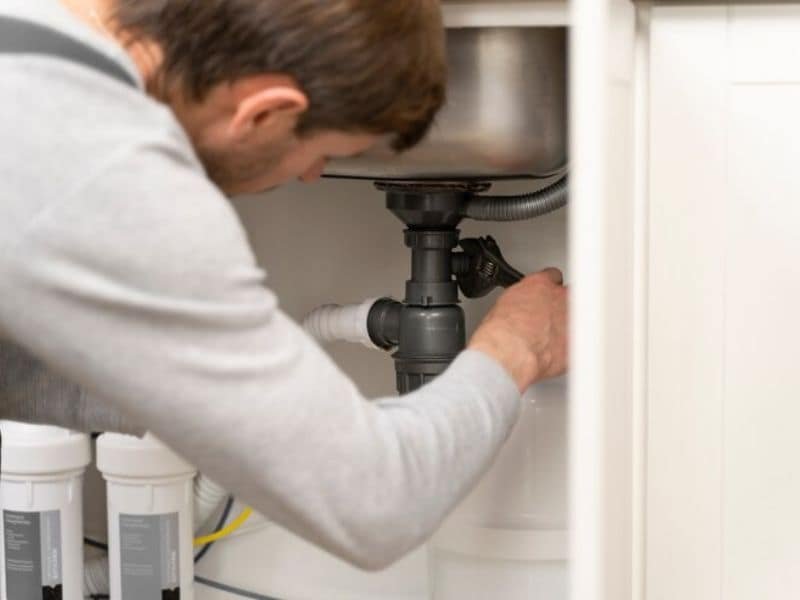What Causes the Rotten Egg Smell in Hot Water?
That strong, rotten egg smell coming from your hot water isn’t just gross—it’s a clear sign something isn’t right inside your water heater. Fortunately, it’s a common issue with a well-known cause: hydrogen sulfide gas, which gives off that classic sulfur or “bad egg” odor.
This odor is often triggered by chemical reactions between the anode rod in your water heater and naturally occurring bacteria in the water. The problem tends to show up in:
- Homes with well water
- Older water heaters
- Systems that haven’t been used in a while
The good news is: this issue is treatable, preventable, and rarely harmful—but ignoring it too long can lead to worse smells, poor water quality, and even corrosion inside your tank.

This guide will walk you through why this smell happens, what you can do to eliminate it, and how to prevent it from coming back.
Is It Dangerous? Should You Be Worried?
Sulfur vs Gas Leaks: Know the Difference
First and foremost, make sure what you’re smelling is actually from the hot water heater and not a gas leak.
- If the smell only appears when running hot water, and cold water smells fine, it’s likely sulfur caused by hydrogen sulfide in the water heater.
- If the smell is constant or strong near gas appliances, leave your home and call the gas company—it could be a natural gas leak, which is very dangerous.
Health Implications of Hydrogen Sulfide
While low levels of hydrogen sulfide in water are not typically dangerous, high concentrations can:
- Irritate eyes, nose, and throat
- Corrode pipes and appliances
- Ruin the taste and smell of water
- Create unpleasant bathing and cooking conditions
It’s more of a comfort and appliance maintenance issue than a health hazard—but it’s still something you’ll want to fix ASAP.
Common Causes of Sulfur Smell in Hot Water Heaters
The Role of the Anode Rod
Inside your water heater is a metal rod called an anode rod, usually made of magnesium or aluminum. Its job is to attract minerals and corrosion, protecting the tank from rusting.
But when this rod reacts with sulfur or sulfate-reducing bacteria (SRB), it can generate hydrogen sulfide gas—which smells like rotten eggs.
Magnesium rods, in particular, are notorious for this reaction in certain water types.
READ MORE: Does a Gas Water Heater Need Electricity?
Bacteria in the Tank and Well Water
If your home uses well water, it may contain anaerobic bacteria (bacteria that thrive without oxygen). These bacteria feed on sulfates in the water and convert them into hydrogen sulfide.
This can happen more often if:
- The tank hasn’t been flushed in a while
- The water sits stagnant
- The temperature is too low to kill off bacteria
The result? A smelly, sulfur-infested tank every time you run hot water.
Initial Quick Fixes to Try
Before diving into a deep clean or replacing parts, there are a few easy fixes that sometimes work—especially if the smell just started recently.
1. Run the Hot Water to Flush the System
Sometimes, running the hot water for 15–20 minutes in a few fixtures helps move out stagnant water in the tank and pipes. This can flush out some of the odor-causing hydrogen sulfide gas.
Try it especially if:
- Your house has been unoccupied for a while
- The heater hasn’t been used in days or weeks
2. Turn Up the Temperature Temporarily
Raising your water heater’s thermostat to 140°F for 6–8 hours can help kill off some of the odor-causing bacteria.
IMPORTANT: Be extremely cautious with high temperatures—140°F can scald skin in seconds, so:
- Warn everyone in the home
- Avoid using hot water during this period
- Turn the temperature back down to 120°F afterward
This is a temporary fix, but it might buy you some time while planning a deeper cleaning or part replacement.
Deep Cleaning and Flushing the Water Heater
If the smell persists, it’s time to roll up your sleeves. A full tank flush and disinfection will usually eliminate the source of the problem.
Step-by-Step Instructions
You’ll need:
- Garden hose
- Bucket
- Screwdriver
- Hydrogen peroxide (3%) or white vinegar
1. Turn off the water heater
- Switch off the power at the circuit breaker.
- Let the tank cool for 1–2 hours.
2. Turn off the cold water supply
- Close the valve on the pipe leading into the top of the heater.
3. Drain the tank
- Attach a garden hose to the drain valve at the bottom.
- Open the drain valve and release water into a bucket or floor drain.
4. Add hydrogen peroxide
- Close the drain valve.
- Open the pressure relief valve or hot water tap to allow air in.
- Pour 1–2 quarts of 3% hydrogen peroxide into the tank through the anode rod port or the hot water outlet pipe using a funnel.
5. Let it sit for 2–3 hours
- Hydrogen peroxide will disinfect the tank and neutralize odors.
6. Refill and flush again
- Open the cold water valve to refill the tank.
- Drain again after 10 minutes to flush out residue.
7. Reconnect and restore power
- Once the tank is full and all air is out of the lines, turn the power back on.
This method usually eliminates the smell for 6–12 months or longer.
READ MORE: How to Drain an Electric Water Heater
Replace the Anode Rod (If Necessary)
If flushing and disinfecting the tank with hydrogen peroxide doesn’t solve the problem—or if the smell returns soon afterward—it may be time to replace the anode rod altogether.
Why the Anode Rod Matters
As mentioned earlier, magnesium anode rods can produce hydrogen sulfide gas when they react with sulfate-reducing bacteria. If your tank is over 3–5 years old, or the odor is persistent, replacing the anode rod with a different type could solve the issue permanently.
Best Anode Rod Options to Eliminate Sulfur Smell
- Aluminum/zinc anode rod: Zinc helps inhibit bacterial growth and reduces odor. These rods are often labeled “odor-fighting” and are highly effective.
- Powered anode rod: A non-sacrificial rod that uses electrical current to prevent corrosion. More expensive, but excellent for smelly water and long-term durability.
Note: Before replacing the anode rod, you’ll need to:
- Drain the tank partially
- Locate and unscrew the rod (usually at the top)
- Install the new rod with Teflon tape to prevent leaks
If you’re not comfortable doing this yourself, a licensed plumber can do it in under an hour.
Water Treatment Solutions for Persistent Odors
If your home has well water or high levels of sulfur, you may need to treat the water at its source to prevent recurring issues.
Whole-House Water Filtration Systems
There is a whole-house filter available that is designed to filter out hydrogen sulfide and will reduce the load on your water heater and remove sulfur odor from the house. Options include:
Options include:
- Activated carbon filters: Good for low levels of sulfur
- Aeration systems: Oxidize hydrogen sulfide and filter it out
- Oxidizing filters with manganese greensand or KDF: Effective for moderate sulfur levels
The systems can be installed at the point of entry, or treatment can be given to all water prior to it entering the heater or faucet.
Shock Chlorination of Well Water
For well systems, you may need to shock the well with chlorine to kill off sulfur bacteria. This is best done by professionals and includes:
- Introducing chlorine into the well system
- Flushing all plumbing fixtures
- Retesting water after treatment
It is a powerful fix for smelly water that is generated at the source – not only in the heater.
READ MORE: How Long Does It Take to Replace a Water Heater?
Preventing Sulfur Smell in the Future
Once you are dealt with the smell, some suggestions are made here to stop it from coming back:
1. Flush the Water Heater Regularly
Sediment and bacteria love stagnant, warm atmosphere. Drain and flush your water heater at least once a year:
- Remove buildup
- Keep bacteria in check
- Extend the life of the tank
2. Raise the Temperature Periodically
For general use, keep the water heater set at 120 ° F, but consider turning it up to 140 ° F for 6 hours every few months to kill bacteria. Just remember:
- Warn household members
- Avoid using hot water during this period
- Turn it back down afterward
3. Use an Odor-Fighting Anode Rod
If you have problems in the past, consider installing an aluminum/zinc or operated anode rod permanently to prevent future smell issues.
4. Maintain Water Treatment Systems
If you have a filtration or softening system, check filters and cartridges regularly. Replacing or cleaning them ensures bacteria and sulfur compounds are filtered effectively.
Conclusion
That rotten egg smell from your hot water is annoying—but it doesn’t have to be permanent. Whether it’s caused by a reactive anode rod, bacterial buildup, or untreated well water, the solutions are often simple and inexpensive.
Start with flushing your water heater and disinfecting with hydrogen peroxide. If the smell returns, consider replacing the anode rod with a zinc or powered version. And if you’re dealing with sulfur in your entire water supply, investing in a filtration system may be the best long-term solution.
With just a little maintenance and a few smart upgrades, you can enjoy clean, fresh-smelling hot water—and peace of mind.
FAQs
1. Why does only my hot water smell like sulfur?
The smell usually comes from your water heater, where heat, bacteria, and the anode rod interact to produce hydrogen sulfide gas.
2. Is it safe to drink or bathe in water that smells like rotten eggs?
Low levels of hydrogen sulfide aren’t typically dangerous, but it can be unpleasant and corrode plumbing over time.
3. Can I remove the anode rod to stop the smell?
You can, but it is not recommended. Anode Rod protects your tank from rust. Removing it can cause warranty or shorten the lifespan of the tank.
4. How long does it take to flush out the sulfur smell?
Flushing and disinfecting can take 2–4 hours, and you should see improvements right away.
5. Will replacing my water heater solve the smell issue?
Perhaps. If the problem lies in the tank, a new heater can help. But if it is in your water supply, you will need additional filtration or treatment.

